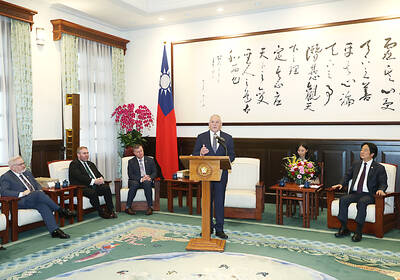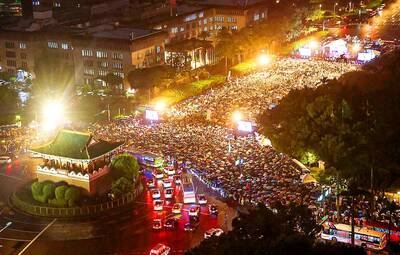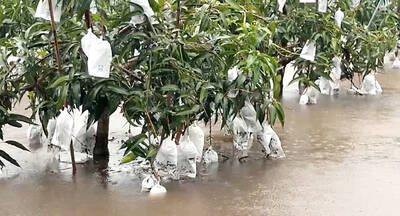Signing a peace agreement with China will be the next step toward advancing and consolidating cross-strait relations, although it will take a long time to achieve such a pact, a former representative to the US said in Taipei yesterday.
“We talked about economic and trade agreements, and financial cooperation will be next. The next thing after that will be a peace agreement, but it will take a long time,” said Stephen Chen (陳錫蕃), who is now a national policy advisor to President Ma Ying-jeou (馬英九). “The so-called confidence-building measures will go beyond a peace agreement.”
MEASURES
Chen made the remarks in response to a reporter’s comment that there seemed to be some concern in Washington about possible military-to-military exchanges between Taiwan and China, as the issue of confidence building has been raised more and more often recently.
Chen said that a peace agreement between both sides of the Taiwan Strait would come before the establishment of confidence building measures because only Taiwan has unilaterally terminated its civil war with China.
“They still think the civil war is not over. That is why the peace agreement is necessary. But a peace agreement does not necessarily include such measures,” he said.
Chen, who also served as convener of the non-government National Policy Foundation, said the US’ Taiwan Relations Act (TRA), which reached its 30th anniversary yesterday, would remain unchanged for a long time despite warming relations across the Taiwan Strait.
TRA
“This particular legislation, the TRA, is the only domestic law of the US that covers its relations with Taiwan, so I think it’s going to last for a long time,” Chen said.
Enacted by the US Congress on April 10, 1979, the TRA is the sole legal document in the US governing bilateral relations. The act requires the US to guarantee defensive arms sales to Taiwan and to maintain the capacity to resist any resort to force or other forms of coercion that would jeopardize the security, the social or economic system of the people of Taiwan.
RELATIONS
Asked whether he thought the US would make any adjustments to the TRA because of concern about the warming relations between Taiwan and China, Chen said he saw no such tendency.
“This development [between Taiwan and China] does not in any way endanger relations between the Republic of China and the US. They can co-exist without any problem,” Chen said.

‘NON-RED’: Taiwan and Ireland should work together to foster a values-driven, democratic economic system, leveraging their complementary industries, Lai said President William Lai (賴清德) yesterday expressed hopes for closer ties between Taiwan and Ireland, and that both countries could collaborate to create a values-driven, democracy-centered economic system. He made the remarks while meeting with an Irish cross-party parliamentary delegation visiting Taiwan. The delegation, led by John McGuinness, deputy speaker of the Irish house of representatives, known as the Dail, includes Irish lawmakers Malcolm Byrne, Barry Ward, Ken O’Flynn and Teresa Costello. McGuinness, who chairs the Ireland-Taiwan Parliamentary Friendship Association, is a friend of Taiwan, and under his leadership, the association’s influence has grown over the past few years, Lai said. Ireland is

A saleswoman, surnamed Chen (陳), earlier this month was handed an 18-month prison term for embezzling more than 2,000 pairs of shoes while working at a department store in Tainan. The Tainan District Court convicted Chen of embezzlement in a ruling on July 7, sentencing her to prison for illegally profiting NT$7.32 million (US$248,929) at the expense of her employer. Chen was also given the opportunity to reach a financial settlement, but she declined. Chen was responsible for the sales counter of Nike shoes at Tainan’s Shinkong Mitsukoshi Zhongshan branch, where she had been employed since October 2019. She had previously worked

FINAL COUNTDOWN: About 50,000 attended a pro-recall rally yesterday, while the KMT and the TPP plan to rally against the recall votes today Democracy activists, together with arts and education representatives, yesterday organized a motorcade, while thousands gathered on Ketagalan Boulevard in Taipei in the evening in support of tomorrow’s recall votes. Recall votes for 24 Chinese Nationalist Party (KMT) lawmakers and suspended Hsinchu City mayor Ann Kao (高虹安) are to be held tomorrow, while recall votes for seven other KMT lawmakers are scheduled for Aug. 23. The afternoon motorcade was led by the Spring Breeze Culture and Arts Foundation, the Tyzen Hsiao Foundation and the Friends of Lee Teng-hui Association, and was joined by delegates from the Taiwan Statebuilding Party and the Taiwan Solidarity

TRANSPORT DISRUPTION: More than 100 ferry services were suspended due to rough seas and strong winds, and eight domestic flights were canceled, the ministry said Tropical Storm Wipha intensified slightly yesterday as it passed closest to Taiwan, dumping more than 200mm of rain in Hualien and Taitung counties, the Central Weather Administration (CWA) said. As of 11am, Wipha was about 210km southwest of Cape Oluanpi (鵝鑾鼻) and was moving west-northwest at 27km per hour (kph). The storm carried maximum sustained winds of 101kph and gusts reaching 126kph, with a 150km radius of strong winds, CWA data showed. Wipha’s outer rainbands began sweeping across Taiwan early yesterday, delivering steady rainfall in the east and scattered showers in other regions, forecasters said. More heavy rain was expected, especially in the eastern